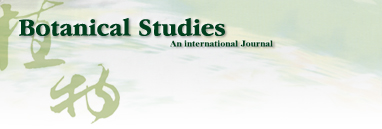 |
|
|
| TITLE | A novel bound form of plant invertase in rice suspension cells |
| AUTHOR | Cheng-Chung Hsiao Biochemistry Laboratory, Department of Agricultural Chemistry, National Taiwan University, 1 Roosevelt Road Section 4, Taipei, Taiwan 106, Republic of China Ru-Huei Fu Biochemistry Laboratory, Department of Agricultural Chemistry, National Taiwan University, 1 Roosevelt Road Section 4, Taipei, Taiwan 106, Republic of China Hsien-Yi Sung* Biochemistry Laboratory, Department of Agricultural Chemistry, National Taiwan University, 1 Roosevelt Road Section 4, Taipei, Taiwan 106, Republic of China |
| FULL TEXT | [in HTML format] [in PDF format] |
| ABSTRACT | A novel alkaline bound invertase (ITab) was purified 116 fold from crude extract of rice suspension cells (Oryza sativa L. cv. Tainong 67). The enzyme can be released by treating the cell wall and membrane fragments with 1.0 M NaCl and purified to homogeneity through the steps of ammonium sulfate precipitation, Con A-Sepharose affinity (non-retained), Sepharose CL-6B, and DEAE-Sepharose chromatographies. The FPLC and SDS-PAGE analyses revealed ITab to have a native molecular mass of about 250 kDa, and it may therefore be homotetramer composed of subunit with a mass of 60 kDa. Isoelectric focusing analysis indicated that the pI value was 4.7. The optimum pH was 7.6 and the optimum temperature was 40-50°C. ITab can hydrolyze sucrose and raffinose, but not maltose. The enzyme did not have affinity toward Con A. So it is not a glycoprotein. The Km for sucrose was 15.28 mM. Fructose and glucose were inhibitors. The enzyme was activated by additional protein such as bovine serum albumin. Tris, metal ions, and thiol reagents inhibited the enzyme activity, but activity could be restored with DTT. It is suggested that sulfhydryl-group(s) exist either in the active site or nearly active site. |
| KEYWORD | Bound form invertase; Rice suspension cells; Sucrose metabolism; |
| ARTICLE INFO | Botanical Bulletin of Academia Sinica, Volume 43 Number 2 April 2002, page 115-122, 8 pages |
| PUBLISHER | Institute of Plant and Microbial Biology, Academia Sinica, Taipei, Taiwan, Republic of China |
